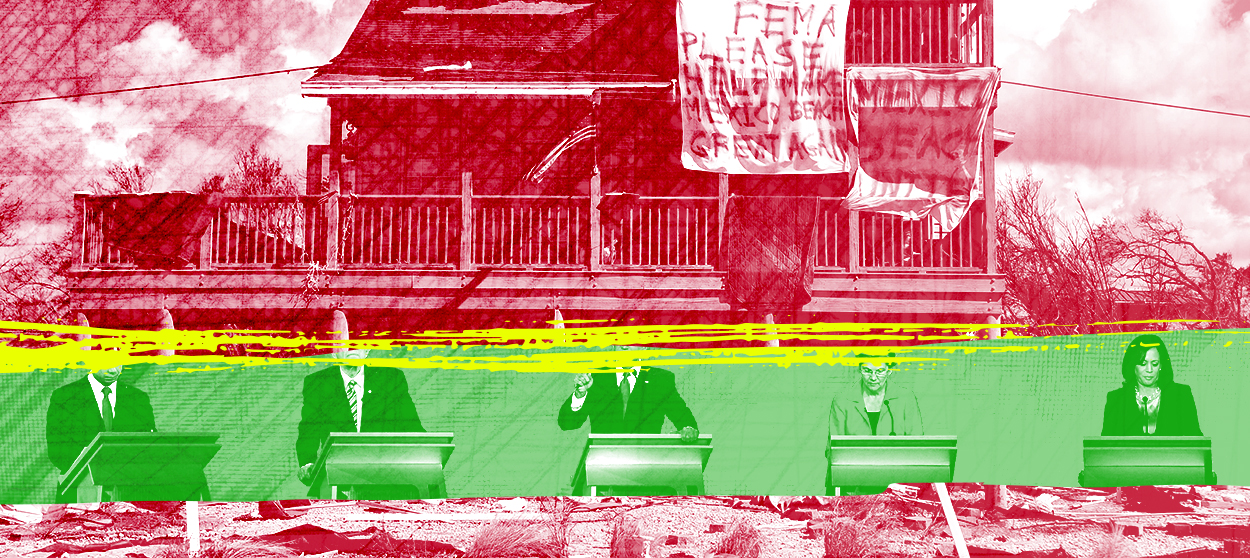What's missing from the Democrats' climate conversation so far
It's not just about reducing emissions


A free daily email with the biggest news stories of the day – and the best features from TheWeek.com
You are now subscribed
Your newsletter sign-up was successful
The audience at CNN's Democratic presidential town hall on climate change last month was filled with survivors of America's recent disasters. There was the mother of a girl who died in Superstorm Sandy, a woman whose home burned down in the Sonoma wildfires, and a woman from the Isle de Jean Charles Band of Biloxi-Chitimacha-Choctaw, a community known as America's first "climate refugees." The CNN anchors stood in front of a banner reading "Climate Crisis" which was flanked on either side by video footage of a brushfire in California and Hurricane Dorian bearing down on the Carolinas. Candidates referenced disasters in passing and told elaborate stories of the disaster-stricken communities they have visited.
Yet, despite the everlasting presence of disaster, little in the way of substantive emergency management policy was offered. Instead, the vast majority of the discussion at the event centered around how to mitigate climate change itself — electric cars, carbon taxes, vegetarianism, lightbulbs, and plastic straws.
This week, when MSNBC hosts their own climate forum featuring a number (but not all) of the presidential primary candidates, they would do well to remember that how to cut future emissions isn't the sum total of climate policy. How we prepare for and respond to even more frequent and more severe disasters will be a major part of our next president's leadership.
The Week
Escape your echo chamber. Get the facts behind the news, plus analysis from multiple perspectives.

Sign up for The Week's Free Newsletters
From our morning news briefing to a weekly Good News Newsletter, get the best of The Week delivered directly to your inbox.
From our morning news briefing to a weekly Good News Newsletter, get the best of The Week delivered directly to your inbox.
The candidates at the CNN town hall were in agreement that more needs to be done to mitigate the damage of future disasters. Some also pointed out the economic benefit of doing so. Research has found that for every $1 spent on federal mitigation programs, $6 is saved in relief efforts.
Senator Amy Klobuchar shared the story of Austin, Minnesota where home buy-outs have been conducted over the past few decades as a solution to repetitive flooding. She also briefly mentioned the need for building stronger levees while Andrew Yang brought up the need to restore ecosystems through projects like reforestation.
A climate scientist asked Senator Bernie Sanders a question directly related to disaster mitigation: "Are you in favor of changing FEMA rules to encourage retreat from properties that have suffered repeated catastrophic losses?"
Sanders said, "yes", and continued on to criticize FEMA's current approach. After pushback from Anderson Cooper about how he would do so, he added: "you do your best through carrots and sticks at the federal level."
A free daily email with the biggest news stories of the day – and the best features from TheWeek.com
Beto O'Rourke said he would "fully fund pre-disaster mitigation grants," presumably in reference to FEMA's existing PDM program, but offered no specifics on project prioritized or source of funding. Even then, funding is an important factor but it's not the only one. Research tells us these projects are also technically complicated, legally complex, and politically controversial.
Castro, who has the most robust ideas about emergency management policy included in his climate plan, referred to the National Disaster Resilience Competition hosted by the Obama administration while he was HUD secretary, which offered an opportunity for states to compete for $1 billion worth of funding for innovative recovery and resilience-related projects.
Elizabeth Warren admitted her adaptation plan, which presumably includes emergency management, is "not all the way stretched out yet." To her credit, she did clarify that she'd like to "work on this with the communities that are affected" at the plan is developed.
Half of the candidates in attendance at the CNN town Hall, including Cory Booker, Pete Buttigieg, Julián Castro, Bernie Sanders, and Andrew Yang will participate in the MSNBC Climate Forum. This is the perfect opportunity to question Sanders on what "sticks and carrots" he intends to use and for Castro to more clearly connect his past experience with future policy. Yang needs to explain how his "Freedom Dividend" is the solution for individual disaster mitigation when that money is also expected to help with health insurance, student loans, and every other financial strain felt by Americans. Importantly, Booker has brought up the challenges of working through federal bureaucracy to receive funding post-disaster but hasn't said what changes he would make to have this process work more efficiently.
Buttigieg, who was asked by an audience member how he would use the Green New Deal as a tool to address disparities in disaster outcomes, introduced a new "disaster preparedness" plan this week. It focuses primarily on funding and growing the current emergency management system by additional protections for FEMA reservists, upgrades to 911, and protecting FEMA's budget from political whims. Arguably the most significant proposal is the development of a "National Catastrophic Extreme Weather insurance program" to benefit both communities and individuals. Further details on this program in particular would be of great value.
MSNBC will also bring candidates we haven't yet heard from on this issue including Michael Bennett, Steve Bullock, John Delaney, Tim Ryan, Tom Steyer, Marianne Williamson, and one of Trump's Republican primary challengers, former Massachusetts Governor Bill Weld. We know even less about how these candidates think about emergency management and disaster policy.
Williamson was recently criticized for a (now deleted) tweet that suggested Hurricane Dorian might change paths because of the power of our collective positive thinking. It falls in line with a similar tweet during the 2010 BP oil disaster off the coast of Louisiana. It is vital that she is questioned about her understanding of disasters because positive thinking isn't a policy solution.
Likewise, vaguely promising to "make communities more resilient" is not a policy solution to the consequences of climate change. How will you make them resilient? How will you account for the wide variation of needs across the country? What will you do to mitigate future risk? What will you do to prepare the nation for an increase in disasters? What will you do to ensure an equitable response? How will you make the recovery process more efficient and just? What executive orders will you sign in the first 100 days?
The urgency of these questions is not a hypothetical, it is a certainty. We need tangible policy proposals to answer them.
America's approach to emergency management has always been reactive. We wait until a disaster happens to take action. We can't do that with the climate crisis, the costs are too great. We must be proactive in our efforts to minimize the consequences of the climate crisis and just, effective, and efficient emergency management policy must be at the center of that task.
During the CNN town hall, Booker stated that committing to rejoining the Paris Climate Agreement is the minimum bar of entry for presidential candidates. I'd argue that so too is having a well-developed plan for how to reform emergency management policy to support communities before, during, and after climate-driven disasters.
Want more essential commentary and analysis like this delivered straight to your inbox? Sign up for The Week's "Today's best articles" newsletter here.
Samantha Montano is an assistant professor of emergency management and disaster science at University of Nebraska Omaha. She has a doctoral degree in emergency management and writes at Disaster-ology.
-
 5 calamitous cartoons about the Washington Post layoffs
5 calamitous cartoons about the Washington Post layoffsCartoons Artists take on a new chapter in journalism, democracy in darkness, and more
-
 Political cartoons for February 14
Political cartoons for February 14Cartoons Saturday's political cartoons include a Valentine's grift, Hillary on the hook, and more
-
 Tourangelle-style pork with prunes recipe
Tourangelle-style pork with prunes recipeThe Week Recommends This traditional, rustic dish is a French classic
-
 The billionaires’ wealth tax: a catastrophe for California?
The billionaires’ wealth tax: a catastrophe for California?Talking Point Peter Thiel and Larry Page preparing to change state residency
-
 Bari Weiss’ ‘60 Minutes’ scandal is about more than one report
Bari Weiss’ ‘60 Minutes’ scandal is about more than one reportIN THE SPOTLIGHT By blocking an approved segment on a controversial prison holding US deportees in El Salvador, the editor-in-chief of CBS News has become the main story
-
 Has Zohran Mamdani shown the Democrats how to win again?
Has Zohran Mamdani shown the Democrats how to win again?Today’s Big Question New York City mayoral election touted as victory for left-wing populists but moderate centrist wins elsewhere present more complex path for Democratic Party
-
 Millions turn out for anti-Trump ‘No Kings’ rallies
Millions turn out for anti-Trump ‘No Kings’ ralliesSpeed Read An estimated 7 million people participated, 2 million more than at the first ‘No Kings’ protest in June
-
 Ghislaine Maxwell: angling for a Trump pardon
Ghislaine Maxwell: angling for a Trump pardonTalking Point Convicted sex trafficker's testimony could shed new light on president's links to Jeffrey Epstein
-
 The last words and final moments of 40 presidents
The last words and final moments of 40 presidentsThe Explainer Some are eloquent quotes worthy of the holders of the highest office in the nation, and others... aren't
-
 The JFK files: the truth at last?
The JFK files: the truth at last?In The Spotlight More than 64,000 previously classified documents relating the 1963 assassination of John F. Kennedy have been released by the Trump administration
-
 'Seriously, not literally': how should the world take Donald Trump?
'Seriously, not literally': how should the world take Donald Trump?Today's big question White House rhetoric and reality look likely to become increasingly blurred
